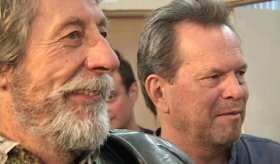|
|
| Tookey's Review |
|
| Pro Reviews |
|
| Mixed Reviews |
|
| Anti Reviews |
|
| Cast |
|
| |
 |
| |
| Released: |
2002 |
| |
|
| Genre: |
DOCUMENTARY
|
| |
|
| Origin: |
US |
| |
|
| Colour: |
C |
| |
|
| Length: |
93 |
|
| |
|
| |
|
|
| |
|
|
Terry Gilliam's The Man Who Killed Don Quixote went into production with a dream cast headed by the great French comic actor Jean Rochefort and the ever-brave Johnny Depp, but folded after one week of shooting and a series of misfortunes that would have stopped pretty much any film without an unlimited budget.
|
Reviewed by Chris Tookey
|
|
The perils of location shooting have rarely been more painfully exposed. A Spanish sandstorm is succeeded by thunder, lightning, hailstorm and mudslides which wash away the sets.
No sooner is the sky bright again (and causing continuity problems) than the local airforce is performing noisy manoeuvres overhead, whereupon the elderly leading man - scheduled to appear in virtually every scene - falls ill with a debilitating disease whose length no one can estimate. As each blow becomes more devastating than the last, director Gilliam's optimism first flags, then evaporates.
To his credit, he never tries to stop the directors of this documentary, Keith Fulton and Louis Pepe, from filming. Inevitably, they try to equate him with Don Quixote, as a man with an impossible dream tilting at windmills, but he comes across as a pragmatic visionary more than a dangerous fantasist, and almost saintly in his affability.
The elements that you might expect from a film about such a disaster - hubristic pride on the part of the director, wild administrative inefficiency, stars throwing tantrums - are absent. Instead, there is a touching sense of people trying to cope with events that are beyond their control, with a budget too tight to leave room for contingency plans.
It's hard to tell from the few clips of finished film and storyboards whether Gilliam's movie might have been a good one or not.
It would certainly have had more visual flair than the vast majority of movies. Jean Rochefort (now, thankfully, recovered) had just the right blend of craziness and dignity to play Quixote. And the device of having a modern advertising executive (Depp) transported back in time to become Quixote's initially reluctant but finally admiring Sancho Panza might have worked as a way of bringing modern audiences in touch with a timeless classic.
It would be a shame if this documentary made Gilliam less bankable. His best efforts - Brazil (1985), The Fisher King (1991) and The Twelve Monkeys (1995) - have all had touches of brilliance, and he looks as if he has at least one good, possibly great, movie left in him.
As a film about a film, Lost in La Mancha hasn't the grandeur or sense of tragic hubris that made classics out of Hearts of Darkness; A Film-maker's Apocalypse (about Coppola's Apocalypse Now) and Burden of Dreams (about the making of Werner Herzog's Fitzcarraldo); but it's a useful reminder to audiences and critics alike that it's easy to pour scorn on a finished cinematic product, and a darn sight harder to make one.
|
|
|
|
|
